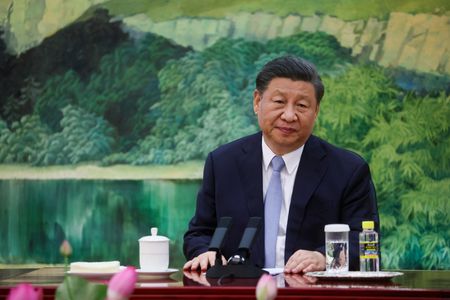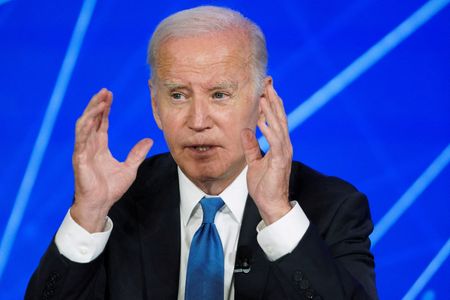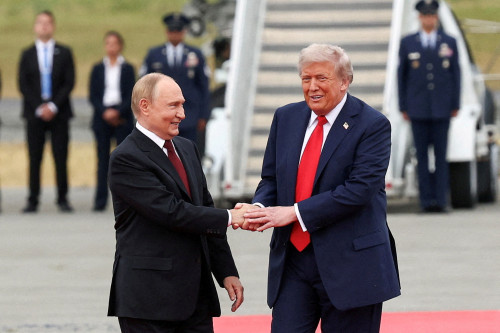By Trevor Hunnicutt and Ryan Woo
KENTFIELD, California/BEIJING (Reuters) -China hit back on Wednesday after U.S. President Joe Biden referred to President Xi Jinping as a “dictator”, saying the remarks were absurd and a provocation, an unexpected flare-up following attempts by both sides to reduce friction.
Biden made his comments just a day after U.S. Secretary of State Antony Blinken completed a visit to China aimed at stabilizing relations that Beijing says are at their lowest point since formal ties were established in 1979.
At a fundraiser in California, Biden said Xi was very embarrassed when a suspected Chinese spy balloon was blown off course over U.S. airspace early this year. Blinken had said on Monday the chapter should be closed.
“The reason why Xi Jinping got very upset in terms of when I shot that balloon down with two box cars full of spy equipment in it was he didn’t know it was there,” Biden said.
“That’s a great embarrassment for dictators. When they didn’t know what happened. That wasn’t supposed to be going where it was. It was blown off course,” Biden said.
Xi became China’s most powerful leader since Mao Zedong after securing a precedent-breaking third term as president in March and head of the Communist Party in October.
He presides over a one-party system that many human rights groups, Western leaders and academics call a dictatorship because it lacks an independent judiciary, free media, or universal suffrage for national office.
Critics of Xi and his party are censored online and risk detention off line.
Biden also said China “has real economic difficulties”.
Biden as president has previously referred to China as “essentially” a dictatorship and “a place for the autocrat, the dictator,” while saying no other world leader wants to be Xi.
But Tuesday’s remarks about the Chinese leader were some of his most direct.
Chinese foreign ministry spokesperson Mao Ning called the remarks “extremely absurd” and “irresponsible” and said they seriously violated facts, diplomatic protocol and China’s political dignity.
“They’re an open political provocation,” she told a regular briefing.
U.S. State Department deputy spokesperson Vedant Patel, asked if Biden’s comments would affect future visits by U.S. and Chinese officials, said Washington continued to expect engagements “in due course, when the time is appropriate.”
“The president believes that diplomacy … is a responsible way to manage tensions, clear up misperceptions, avoid miscalculations and all of this in our interests to do that,” Patel said. “That does not mean of course we will not be blunt and forthright about our differences.”
LASTING DAMAGE UNLIKELY
Political analysts played down the likely damage to U.S.-China engagement.
“Biden’s big mouth is a loose cannon,” said Wu Xinbo, director of the Center for American Studies at Fudan University in Shanghai. He said the remarks would affect mutual trust, including in communications between the leaders, but would not erase what Blinken had achieved on his China visit.
Yun Sun, head of the China program at Washington’s Stimson Center, said she thought the U.S. side “wants to let this quietly go away.”
“And the Chinese will not want to blow this out of proportion, ruining the prospect of a process leading to Xi’s bilateral summit with Biden in November,” referring to a possible meeting when the United States hosts the APEC forum.
Blinken and Xi agreed in their meeting on Monday to stabilize the U.S.-China rivalry so it did not veer into conflict. While the visit did not yield breakthroughs, both sides agreed to continue diplomatic engagement with more visits by U.S. officials in the coming weeks and months.
Biden said later on Tuesday that U.S. climate envoy John Kerry may go to China soon. On Monday, he said he thought relations were on the right path and indicated that progress was made during Blinken’s trip.
Biden has often defined the current state of global politics as a battle between democracy and autocracy, and said democratically-led countries should establish economic ties to balance autocratic-led countries, aiming at Russia and China.
Beijing in the past has bristled at that definition. Xi told Biden during a November 2022 meeting that China has “Chinese-style democracy,” Chinese state news reported then.
Chiming in from Moscow, Kremlin spokesman Dmitry Peskov told reporters on Wednesday that Biden’s comments contradicted Blinken’s efforts to ease tensions with Beijing, describing the remarks as “incomprehensible”.
“However, that’s their business,” Peskov said. “We’ve our own bad relations with the United States of America and our very good relations with the People’s Republic of China.”
Other world leaders seemed reluctant to get involved. Asked repeatedly about the situation, the spokesperson of German chancellor Olaf Scholz said only: “The Federal Government has taken note of the American President’s statement.”
(Reporting by Trevor Hunnicutt; additional reporting by Ryan Woo in Beijing, Andreas Rinke in Berlin and Kanishka Singh, David Brunnstrom, Simon Lewis and Daphne Psaledakis in Washington; Editing by Simon Cameron-Moore, Angus MacSwan and Grant McCool)






